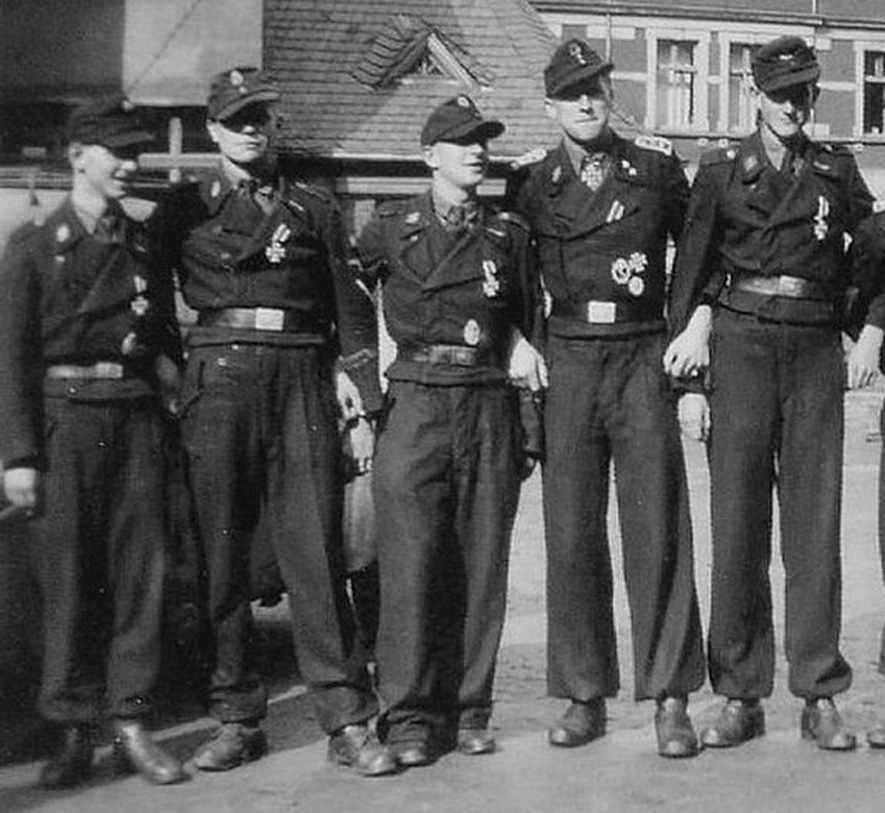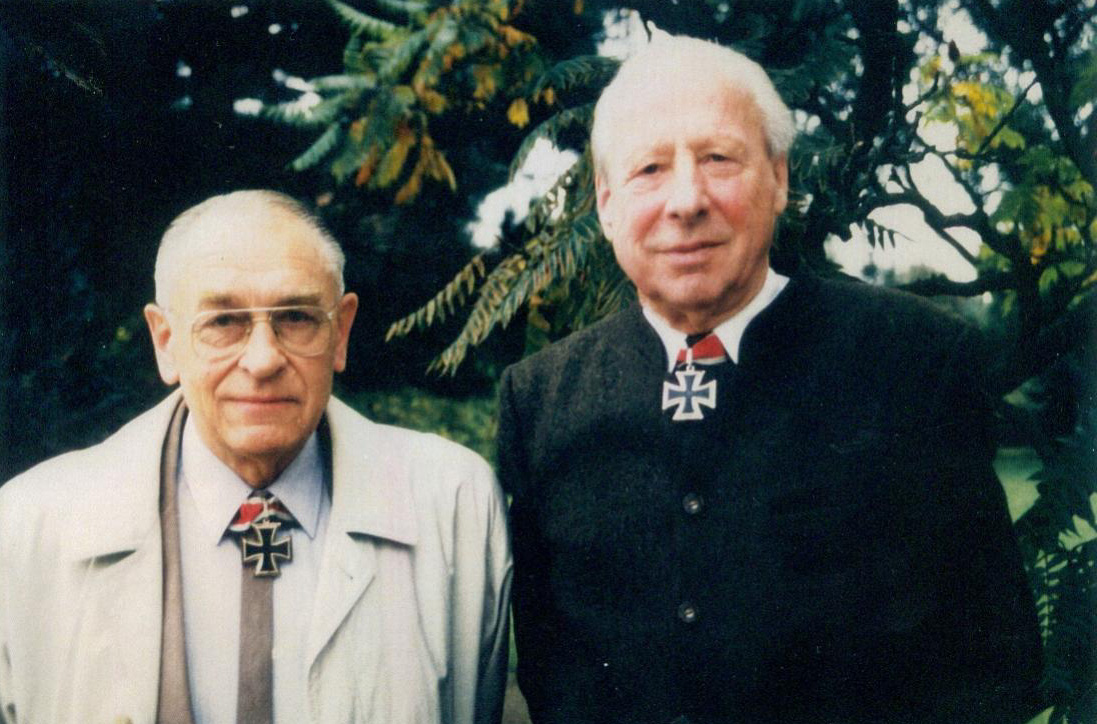Interview with Knight's Cross winner Ernst Barkmann, Panther tank commander of 2. SS-Panzer Division 'Das Reich', Kisdorf, Germany, 1990.
[Above: Handsome and daring Ernst Barkmann .]

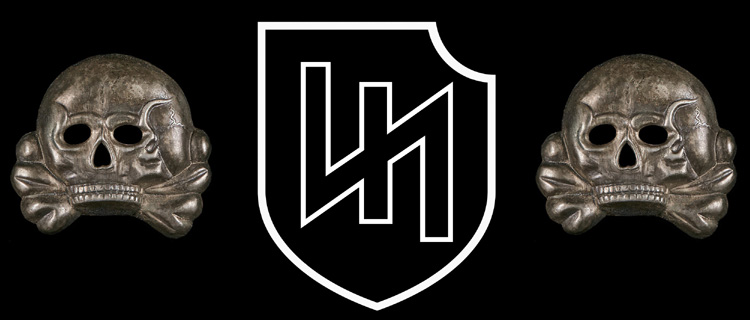
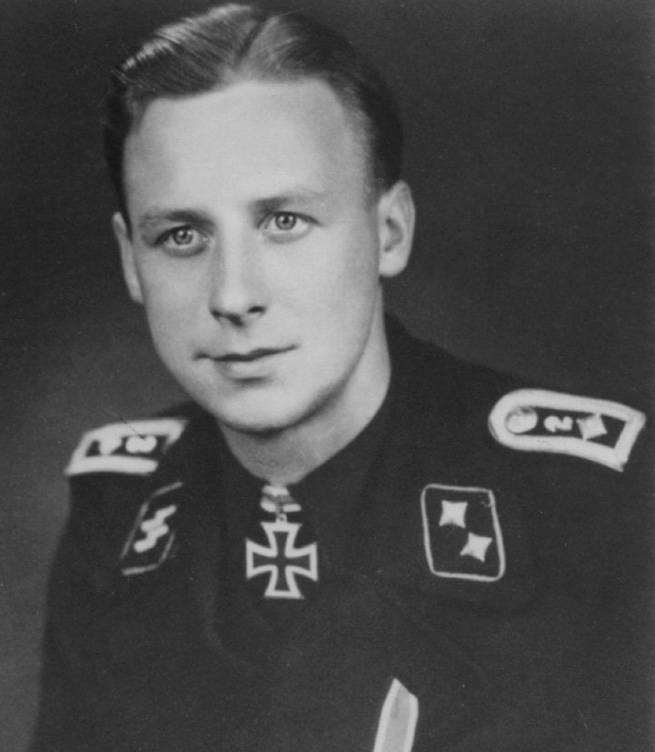
Interview with Knight's Cross winner Ernst Barkmann, Panther tank commander of 2. SS-Panzer Division 'Das Reich', Kisdorf, Germany, 1990.
[Above: Handsome and daring Ernst Barkmann .]



Ernst: When I volunteered for service in the SS-Verfügungtruppe, it was not
called the Waffen-SS, but special duty troops. I hailed from farmers who
absolutely adored the Führer, the idea of blood and soil are what every
German farm family held dear for centuries. My father was a very early
supporter so it was only natural I should have the same interest. I joined the
Hitler Youth, cared for horses while also working on the farm, and then did
my RAD [Reichsarbeitsdienst, or Reich Labor Service] service. By 1939, I made up my mind to join the SS-VT to fulfill
military service requirements.
For me, the SS was a way to show loyalty to Germany and it was the
bodyguards to the Führer. SS men also guarded the sacred National Socialist
sites around Germany. I felt very proud to don the black tunic of an elite
guard; I understood how the men of the Lifeguard Hussars felt defending their
king. Although the training was very hard, I actually liked it very much, in
the SS there was very little complaining as we all volunteered for what we
were doing. There were very few dropouts, mostly from momma's boys.
Heavy drinkers who could not handle the healthy lifestyle had problems too.
Drinking and smoking were heavily frowned upon.
What was it like serving in the RAD?
Ernst: The RAD was something the Führer did not create, but he championed
as a form of unity. Under German law every able young man and woman
would serve six months. We could be sent anywhere in the Reich, but most
were stationed close to home to be able to see family. Most of the work I did
was working on revitalizing German beaches and waterways, which had been
neglected after the first war.
The Führer was the first leader to address the environment, the
Greens [political party in Germany] think they are the first party to help the land, but they are wrong.
There were stagnant bodies of water that we rebuilt to bring fresh life to
wetlands and planted many trees to help with erosion. German industry was
also coming up with ways to clean up pollution from coal mines and plants,
which polluted the nearby water.
Since I was raised on the land, I learned to have great respect for
nature, and National Socialist Germany is the only nation in history to try to
repair the damage humans have caused. There were even organization
branches to help the animals recover from overhunting. Some of my family
were not happy at laws that introduced fees to hunt non-destructive animals.
Deer, boar, and foxes could wreak havoc on farmers, so these were allowed,
but other species had bag limits and higher fees that went toward helping
them multiply. My father had a prized gun collection of rifles and shotguns
to help him bag good trophies.
The RAD was so successful that many nations, including yours [the USA had the Civilian Conservation Corps (CCC)],
created their own versions. Our example was designed to build trust and form
respect for all Germans, regardless of status. The wealthy worked with the
poor, there was no class structure, and we all got dirty together. In my troop,
we had a much-esteemed member of the Siemens [large industrial manufacturing company] family and he may not have
exactly enjoyed it all, but he got to see what real labor is all about and left
with a respect that only those who go through this can understand.
You were part of the war with Poland, what was your experience and how
did you view the Polish people?
Ernst: Yes, the war with Poland was unfortunate but also inevitable. I would
say most Germans before the war saw Poland as an ex-subject. We ruled over
the Poles for a long time, along with Russia. I believe we treated them well,
but they also had a minority who wanted to be an independent state. After the
first war that became a reality, but it also over emboldened the government.
The Reds attacked them, and they miraculously beat the Reds back, but they
attacked our borders to take more land away by force, this went on until the
1930s.
Our Freikorps stopped this, and it planted the seed of hate. Many
Poles felt we owed them and looked upon Germany as a bully whose time
had come. The Führer had one main plan, to reunite lost lands, he was very
successful in this promise, but the English did not want a revived Germany,
so they used Poland as an excuse to start a new war. My government tried to work
out very reasonable deals with Poland, all of them were refused at England's
demand. You add to this the plight of Germans in Poland who, due to the
tension, were being harassed, persecuted, and killed, so Germany had to act.
By September 1939 I was a machine gunner in the Germania
Regiment. Poland was expecting war and was prepared for us when we
crossed the border, they had offensive postures. Our Luftwaffe outclassed the
Polish air force and paved the way for the ground units. I saw our Panzers for
the first time and was quite impressed, which held an attraction for me for the rest of the war. The Poles, however, had better armor, and knocked out a
good amount. They were supplied with German WW1 weapons, French and
English tanks, and American trucks.
I found the soldiers to be very agreeable, we often joked with them
that they were headed towards Berlin, but not how they envisioned it. We
allowed their officers dignified surrenders and had orders to treat them with
respect. There were some who were guilty of atrocities against the civilians and they had to be investigated, but many were processed and released to go
home after a few weeks. Polish civilians were well-behaved, giving us very
few problems. Many would bring food to sell to us, which, since our rations
were sometimes meager, was appreciated.
A few SS-VT units had some problems in combat, we had been
issued old and foreign weapons that hindered our ability to engage the enemy
properly. I understand that old army officers have criticized the SS, but they
issued us inferior weapons. They threw us into battle knowing we would have
problems with poor equipment. Overall, we did very well against a larger
army with better equipment.
[Above: Barkmann atop his armored beast.]
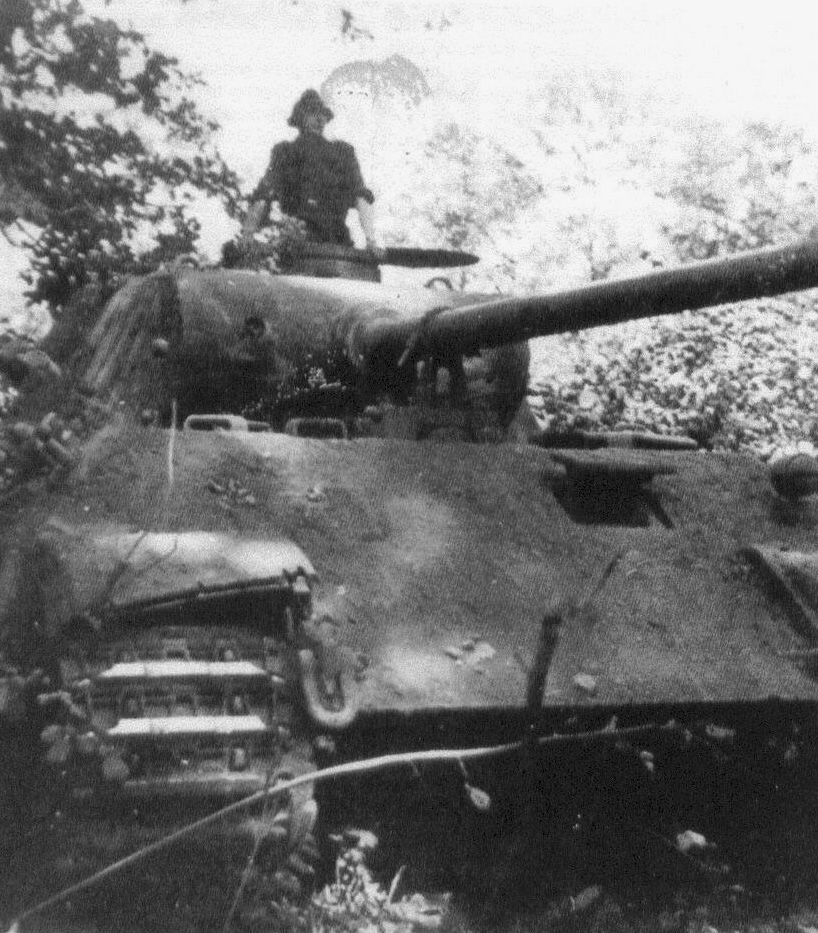
You fought in the West against the English and French, what was your
experience?
Ernst: The SS-VT was on the north wing of the attack, we walked into
Holland uninvited, but the Dutch did make it clear they sided with the Allies,
so they were de facto an enemy. They mainly put up symbolic fights and
gave up easily, lucky for us. We did not see heavy fighting until Belgium and
France, by then the Allies knew they fell into a trap, so they tried to break
out, but failed.
We pushed them into the Dunkirk pocket, and then were ordered to
stop; the Führer had his reasons, which many of us believe was to show he
wanted to offer peace to a beaten foe. By now we had lots of confidence in our
leaders and weapons. Our Panzers broke the enemy open, but they had better
armor than we did; only the Panzer IV could take them on, and the 88mm
came into fame after Artois.
We guarded many English and French prisoners and would spend
hours talking to them when we could. No one could understand why it came
to war again, as they seemed like brothers. The civilians were fleeing from
the battles, and we had to deal with feeding them, and helping them, which
slowed us down sometimes, and made officers angry. I remember our
surgeon had to help deliver a baby with the sounds of battle close by. We
enjoyed the weather immensely, getting suntans when we could. Some men
were very active in persuing French girls, who flirted nonstop. Orders had to be issued on relationship rules, and not pursuing married women, especially wives of prisoners-of-war.
How did you come to the Panzer arm of the Waffen-SS?
Ernst: My Division 'Reich' was active on the Eastern Front, and I had been
wounded which put me in the hospital with a fellow from a Panzer Regiment.
We talked a lot and I would write my then girlfriend Charlotte about this
branch, which had black uniforms, she thought I would look handsome in it.
Therefore, I had to look handsome for her, so I set my mind on the Panzer
arm. I had been promoted to an NCO and was assigned to help train new
Dutch recruits who were joining our fight against Jewish Bolshevism. While
it was very rewarding to work with these comrades, the Panzers still called
out to me.
I always live by the phrase that 'Every soldier has a duty to his
fatherland and its people, even if that duty means death.' Therefore, even
though the Panzer arm was dangerous and rife with chances to be killed, I
jumped when offered a spot in Panzer school. Das Reich was expanding and
getting better Panzers. I was a wounded combat veteran with the Iron Cross,
so I fit right into this branch. Our instructors were Panzer veterans with a
lot of combat experience to pass on.
We trained mainly on the Panzer II and Panzer III, and focused on
tank-on-tank tactics, staying organized, and communicating. We learned each
role on a Panzer, so anyone could fill in for a wounded comrade. By the time
training was finished the situation on the Eastern Front was in the balance. I
was assigned to a Panzer III long-barrel, just in time to retake Kharkov. I
remember it was very cold, and thankfully the Panzer engine offered us some
heat. This is where the first successes came, knocking out anti-tank guns,
strong points, and armored vehicles. We did have to go against the T-34,
which could easily knock us out, but we had better tactics and defeated units
much larger than us. I was very happy when I had the chance to become a commander on
a Panther, which took me back to school again. I was able to spend a
lot of time with Charlotte and do some traveling, which still went on in
wartime.
You fought in Normandy and won the Knight's Cross. Can you describe what
the battle was like, and how you won the award?
Ernst: I was still with the 2. Panzer Regiment of Das Reich, and after heavy action
in Russia, we were sent to France to refit and stand battle ready to defeat the invasion we knew was coming. The weather was great, so we had a lot of
time to train and sightsee, Charlotte came to visit often, and we began to talk
about marriage in the summer. A French girl who sewed for us was not happy
to hear of this, I told her we can still be friends, but she needed more and took
a comrade as her new infatuation.
When the invasion was announced, our Panzer regiment was
ordered to move north which was a nightmare. Trains were attacked, even
passenger ones. Bombers and resistance cells blew bridges with Allied agents
working with them. My division had trouble with these people, which caused
much hatred due to the reprisals. We arrived in Normandy too late to turn
the tide; the Allies already had a numerical superiority over us and controlled
the air. We had to move mostly at night.
We learned to camouflage everything, and I mean everything. The
Jabos [American fighter-bombers] hit anything they thought looked German. German strategy was to hold
a very strong defensive line and blunt any Allied attacks. We did this well for
2 months, but slowly gave ground, and had a hard time retaking it. Our
Panthers could knock out any Allied tank; the problem was they had what
seemed like an unlimited supply to draw from. The Panther still had a few
teething troubles that were very aggravating.
I learned to hide in ambush, knock the lead tank out and if
possible, the last vehicle, to seal them in. They always called in air support
whenever we held them up, which was not as effective as they claim, but it
did disrupt us, and allow enemy escapes. During the fights in Normandy, we
fought very hard, and the Allies learned to respect soldiers of the SS, however
because of our prowess, it also caused overreaction and crimes to be
committed against surrendering SS soldiers.
We fought like lions, and the Allies wanted revenge for fallen
friends. Some claim orders were given by a few units to not take SS prisoners,
which in turn, SS units facing them had to follow suit in order to stop it. I
never saw this, and we treated our prisoners as we would want to be treated.
There were a couple times my Panzer was cut off and we had to navigate
back to our lines sometimes on foot. I would see enemy soldiers, but dare not
engage them, as they were doing their business with no weapons.
As to the incident that brought me the Knight's Cross, I was with a
detached formation that was a mix of SS and Wehrmacht that had been beaten
back in an offensive. I was alone and scouting roads to villages, when I
happened to stop by a large group of trees that gave excellent cover. I heard
shooting in the distance, and ordered some men to go forward to scout, they
came back yelling it was the Amis [slang for Americans] coming.
I could hear engines, so I ordered to prepare for action and turned
the turret toward the bend in the road, soon they appeared. We opened fire on the lead tank knocking it out, then soon after another rounded the corner. This
was an advanced guard for an attack on a nearby village. We had been well-supplied, so I had the ability to hold them up to allow for reinforcements, or
so I hoped.
As usual, they stopped and called in air attacks that damaged us, but
they also could not move, and were afraid to advance. When they tried, again
we knocked out a truck or armored car, I cannot remember. We held them
in our crosshairs as long as we could, repairing the damage, and then
withdrawing for fear of being surprised. This action allowed for new defenses
and evacuations, we were greeted as heroes, but this action was just our duty and taking advantage of cover.
Recently a Frenchman who studies Panzers came to speak to me and
said the Allies claim this never happened. I do not understand why, war is
confusing, losses are easy to miss, and numbers do not always add up in the
fog of war. I saw Sherman tanks that we knocked out but if not, they were
still tanks and we held up an advance. There is no way I could be mistaken
about that, and my crew saw the same thing I did. I have learned that just
because the Allies say something happened, does not make it true.
I was put up for the award and presented with it later on, but let me
tell you, the best part was getting a long leave to wed my fiancé. I had been
looking forward to this for a long time, she even teased me by having a
girlfriend take pictures of her in undergarments she bought in France for the
honeymoon. You have a pretty girl, so you understand. English soldiers stole
these and letters she wrote to me when I was captured. These men were not
the same enemy I met in France in 1940, these men were drunk on
propaganda and hate, and I saw them beat many soldiers, some just young
boys.
How do you feel about the SS being labeled a criminal organization?
Ernst: The Allies won the war, they get to say anything they want, make any
rule, and tell any story that they want. I refuse to discuss this topic as it gets
one in trouble, as they have sent moles to us, but I will tell you, the Allies lie.
They deliberately bombed civilians to kill as many as they could. They raped
women on a scale that has never happened in history, in Germany and all
over Europe. They hunted down anyone who was a party member, and put
them in concentration camps, while shouting how evil it was to put people in
camps. They made villains heroes and heroes villains.
They are complete hypocrites with their policies, they killed spies,
but we are criminals for doing the same. They hanged traitors and saboteurs,
yet we are criminals for the same actions.
They went house-to-house to loot any books and had huge bonfires to burn them, we burned anti-German smut
and communist propaganda, yet we are evil? They even burned old family
bibles that held generations of history. We could do nothing to stop this and
if one tried, they were killed or sent away permanently.
They hung a relative of mine, whom the Reds say was a murdering
camp guard, they claim these camps were built to kill. She was barely 24, and
the prettiest girl in town. She applied for work with the SS and was not
technically a guard, but more of a helper in a women's camp. She told me
once, during my wedding reception, that she liked being able to help reform
women who were caught up in bad situations.
Some were criminals, part of gangs that were caught. Some were
resistance members serving sentences for sabotage, and others black
marketers. She would never hurt anyone; one could see that in her eyes. I do
not believe for one second any of the tales told by the liars who were sent to
these camps. I will tell you very few say it was bad, also, of course, the ones
who defend us are shut up. Yet the vengeful winners made her out to be cruel
and soulless, lies of hateful people killed her.
They did this with the Waffen-SS; we fought for our country with
honor and fought a satanic enemy that made us all pay at war's end. What
they did to Germany and our people will never be forgotten or forgiven. I
want you to take the words I have told you and make sure you tell people
what we survived.
We were not soldiers of an evil cause or leader, but men who were
forced into a war against heartless enemies who now cry out in pain as they
strike us. Your aunt has been a great help to try to correct some of this, but
we face a mounting challenge that is only getting harder after each year.
Cries from Jewish groups are loud and since they own the world's
communications, they are very successful in spreading history as they want
it told. Soon it will be illegal to defend any actions of German soldiers.
[Above: Barkmann (2nd from right) with his tank crew in France, summer, 1944.]
[Above: Fritz Langanke (left) and Ernst Barkmann, best friends after WWII, they were both Knight's Cross winners and from Panzer Regiment 'Das Reich'.]
